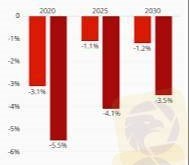
2025-02-15 02:54
업계에서The Effects of Brexit on Forex Economic Trends
#firstdealofthenewyearastylz
Brexit has had significant and lasting effects on foreign exchange (Forex) economic trends, particularly impacting the British pound (GBP) and the euro (EUR). Here are the key effects:
1. Volatility in GBP
Since the 2016 Brexit referendum, the GBP has experienced increased volatility.
Major events, such as the UK-EU negotiations and the final trade deal, triggered sharp fluctuations in the pound’s value.
The GBP dropped nearly 10% against the USD on the day of the referendum, its biggest one-day fall in history.
2. Long-term Depreciation of GBP
The pound has generally remained weaker compared to pre-Brexit levels, making UK exports cheaper but increasing import costs.
Investor uncertainty about the UK's economic future has contributed to reduced foreign investment, further pressuring GBP.
3. Impact on the Euro (EUR)
Brexit also caused instability for the euro, as the UK was one of the EU’s biggest economies.
Although the euro was less affected than the pound, investor concerns about EU economic stability led to periodic declines.
4. Reduced Liquidity in FX Markets
London was a global forex trading hub, but Brexit led some financial institutions to shift operations to other EU cities (e.g., Frankfurt and Paris).
This shift has reduced liquidity in GBP trading and increased costs for forex transactions.
5. Trade Disruptions and Exchange Rate Impact
New trade barriers and reduced EU-UK trade volumes have influenced currency movements.
The GBP’s value has been sensitive to trade data and supply chain disruptions, affecting forex trends.
6. Interest Rate and Inflation Effects
Brexit-related inflation has led the Bank of England (BoE) to raise interest rates, influencing forex markets.
Higher interest rates have occasionally supported GBP, but inflation-driven economic uncertainty has offset these gains.
7. Shift in Safe-Haven Currencies
Brexit uncertainty increased demand for safe-haven currencies like the USD, JPY, and CHF.
This shift caused temporary declines in both GBP and EUR during uncertain periods.
Conclusion
Brexit has led to sustained forex market volatility, a weaker GBP, and changes in trading dynamics. The long-term effects continue to unfold, with forex traders closely watching UK-EU trade relations, economic policies, and global market conditions.
좋아요 0

General Solo
Mga brokers
인기있는 콘텐츠
시장 분석
투자주체별매매 동향
시장 분석
유로존 경제 쇠퇴 위기 직면
시장 분석
국제 유가는 어디로
시장 분석
미국증시 레버리지(Leverage)·인버스(Inverse)형의 ETF, 최근 사상 최대 신
시장 분석
투기장 된 원유 ETL...첫 투자위험 발령
시장 분석
RBNZ 양적완화 확대
포럼 카테고리

플랫폼

전시회

대리상

신병 모집

EA

업계에서

시장

인덱스
The Effects of Brexit on Forex Economic Trends
 홍콩 | 2025-02-15 02:54
홍콩 | 2025-02-15 02:54#firstdealofthenewyearastylz
Brexit has had significant and lasting effects on foreign exchange (Forex) economic trends, particularly impacting the British pound (GBP) and the euro (EUR). Here are the key effects:
1. Volatility in GBP
Since the 2016 Brexit referendum, the GBP has experienced increased volatility.
Major events, such as the UK-EU negotiations and the final trade deal, triggered sharp fluctuations in the pound’s value.
The GBP dropped nearly 10% against the USD on the day of the referendum, its biggest one-day fall in history.
2. Long-term Depreciation of GBP
The pound has generally remained weaker compared to pre-Brexit levels, making UK exports cheaper but increasing import costs.
Investor uncertainty about the UK's economic future has contributed to reduced foreign investment, further pressuring GBP.
3. Impact on the Euro (EUR)
Brexit also caused instability for the euro, as the UK was one of the EU’s biggest economies.
Although the euro was less affected than the pound, investor concerns about EU economic stability led to periodic declines.
4. Reduced Liquidity in FX Markets
London was a global forex trading hub, but Brexit led some financial institutions to shift operations to other EU cities (e.g., Frankfurt and Paris).
This shift has reduced liquidity in GBP trading and increased costs for forex transactions.
5. Trade Disruptions and Exchange Rate Impact
New trade barriers and reduced EU-UK trade volumes have influenced currency movements.
The GBP’s value has been sensitive to trade data and supply chain disruptions, affecting forex trends.
6. Interest Rate and Inflation Effects
Brexit-related inflation has led the Bank of England (BoE) to raise interest rates, influencing forex markets.
Higher interest rates have occasionally supported GBP, but inflation-driven economic uncertainty has offset these gains.
7. Shift in Safe-Haven Currencies
Brexit uncertainty increased demand for safe-haven currencies like the USD, JPY, and CHF.
This shift caused temporary declines in both GBP and EUR during uncertain periods.
Conclusion
Brexit has led to sustained forex market volatility, a weaker GBP, and changes in trading dynamics. The long-term effects continue to unfold, with forex traders closely watching UK-EU trade relations, economic policies, and global market conditions.
좋아요 0
나 도 댓 글 달 래.
제출
0코멘트

댓글이 아직 없습니다. 첫 번째를 만드십시오.

제출
댓글이 아직 없습니다. 첫 번째를 만드십시오.